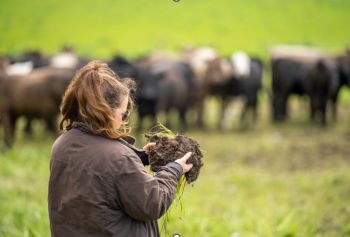BBC Woman's Hour special on women in farming
By: Mariam Zubair
Last updated: Wednesday, 11 June 2025

I just finished listening back to the recent special episode of BBC Woman's Hour on women in farming and want to share a few reflections on this fantastic show. Whilst I wholeheartedly congratulate all involved for putting together such a balanced and well-informed piece, there is always room for critical engagement, right?
Without further ado…
1. I'm hugely in awe of contributor Sinead Fenton for speaking out so frankly about her journey into farming 'from scratch', and the difficult experiences she's endured as someone who's had to fight so hard for the sheer privilege. I'm particularly impressed that she did so without trying to 'sugar the pill'. This must have been especially hard given that she was interviewed alongside two other women who had apparently not had to navigate the same level of obstacles to getting set up on the land.
2. I was frustrated that there wasn't more attention given to inequalities of access to land, accommodation, and training - as well as inequalities in the provision of support on the job and career progression - experienced by women. This is especially true for those women who are entering farming from non-farming backgrounds, and MOST ESPECIALLY true for women entering farming from working-class and minority backgrounds (inc. black and women of colour, gender diverse, disabled, neurodiverse, and LGBTQ++ people, among others). For more on this, you can watch my talk on Women’s journeys into and through agroecology in the UK. I have written a full-length paper that dives into these some of issues in much more depth – due to be published this autumn. Watch this space.
3. Although farming is awesome and the reality is that many of us non-farming folk long for more connection and closeness to the land, I do think that there is a danger that the media and farming organisations often paint a rose-tinted picture of farming. I know that the press often reports on farmers' mental health and the pressures they face, but they need to be more open about farming as an essentially closed occupation, as far as most of us are concerned. As one of the contributors said, 'unless you're from a farming background, to buy land or get a tenancy is extremely hard'.
4. Some statistics about women's involvement in farming compared to men's were mentioned at the start of the show - and the idea that women are increasingly claiming the identity of 'farmer' (as opposed to the traditional 'farmer's wife’) was returned to at various points. This and other aspects of the wider social-historical context were skilfully explored and explained within the special episode. However, this way of framing the issues still situates farming within the confines of multigenerational family enterprises, only without being explicit about it. I appreciate that the NFU and others in the farming community are thinking about the issues faced by first generation new entrants, but we need to see more action. In the words of one of my research participants - why can't we have something in farming that's just beyond the heterosexual family unit? Perhaps it would be interesting for Anita Rani to talk to trailblazers in the ‘queering’ of farmwork like those at Folx Farm in East Sussex?
Of course, I also thoroughly enjoyed listening to this episode - it was an extremely informative and engaging piece, and I was really pleased to hear women's experiences of farming being attended to on such an important and widely accessed show. I'm also super keen to follow the new study into female farmers' health and wellbeing, led by Dr Rebecca Wheeler.
The episode aired on the 26th of May - you can listen to it for free on the BBC Sounds app. https://www.bbc.co.uk/sounds/play/m002cpqs

